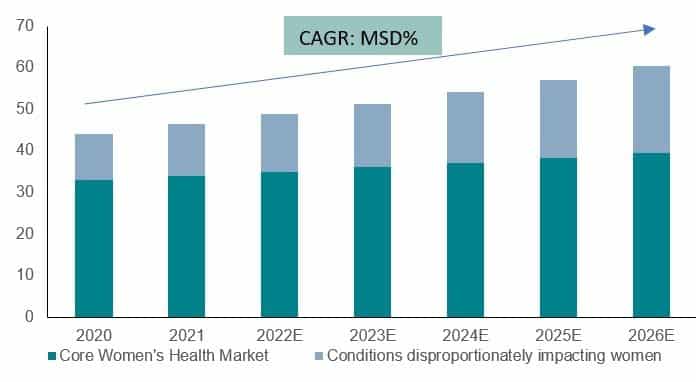From countries to corporates, technology is accelerating change in every aspect of modern life. Recent technological innovations are delivering benefits and empowering women to take charge of their own health, while also broadening healthcare access to emerging markets and fuelling women’s health worldwide.
However, women’s healthcare needs remain underserved, despite making up half the population worldwide, and representing US$500 billion in annual medical expenses. BNP Paribas Exane pharmaceuticals and medtech analyst Navann Ty says: “The women’s healthcare market is underserved and ripe for innovation: only 5% of budgets are spent on conditions specific to a group that makes up 50% of the global population.”

The women’s healthcare market is underserved and ripe for innovation: only 5% of budgets are spent on conditions specific to a group that makes up 50% of the global population.
Navann Ty, Pharmaceuticals and Medtech Analyst, BNP Paribas Exane
This points to significant scope for growth to close the gender gap in healthcare – a theme recognised by this year’s International Women’s Day, “DigitALL: Innovation and technology for gender equality”, focusing on the role of tech and education to promote equality and the empowerment of all women and girls.
Mind the gap
Certain health conditions affect women differently or disproportionately, and sociocultural factors mean that women and girls do not necessarily have access to quality health services, accentuating already existing disparities. For example, women are seven times more likely than men to be misdiagnosed and discharged in the middle of having a heart attack. In 2016, the World Health Organisation (WHO) found that although women in the European Union live longer than men, they spend more of their lives in poor health.
With little investment historically earmarked for research into women’s health, wide gaps have emerged in both research and treatment. Women’s continued underrepresentation in clinical trials has widened the gap further.
The power of Femtech
Technology offers substantial scope for empowering women to better health. In the space of just a few years, a slew of Femtech startups have emerged. Global venture capital investment surpassed US$2 billion for the first time in 2021 and is set to grow strongly in the years to come.
According to Zahid Moneer, Managing Director, Investment Banking, Healthcare, BNP Paribas: “the Femtech industry, aligned with biotechnology and innovative Pharma R&D, is already taking women’s healthcare forward in leaps and bounds, but untapped potential remains and this market is set to go from strength to strength over the years ahead.”

The Femtech industry, aligned with biotechnology and innovative Pharma R&D, is already taking women’s healthcare forward in leaps and bounds, but untapped potential remains and this market is set to go from strength to strength over the years ahead.
Zahid Moneer, Managing Director, Investment Banking, Healthcare, BNP Paribas
Total addressable market size of US$60 billion expected in 2026e

BNP Paribas Exane report “Her time is now”, published 8 December 2022
What is Femtech?
Femtech is a range of tech-enabled, consumer-centric products and solutions for health conditions that affect women disproportionately or differently. It is a fast-growing sub-sector of Healthtech encompassing technology that supports women’s health across five main areas:
- Fertility
- Pregnancy and motherhood
- Sexual and gynaecological health
- Chronic disease
- Lifestyle and wellness
Sources: BNP Paribas, CNBC, International Women’s Day organisation
Personalised healthcare could drive Femtech growth further
Going forward, growth is set to be powered by greater discussion around women’s health issues, expanding data use and digitalisation currently impacting all business sectors. One area that could narrow the gender health gap is the trend towards personalised healthcare, defined as tailor-made prevention, diagnosis and treatment for individuals or groups of individuals. A fast growing segment, in the EU, the International Consortium for Personalised Medicine (ICPM) aims to establish Europe as a global leader in personalised medicine research, driving progress for previously underserved groups and empowering patients. Some research suggests that the market for personalised medicine could grow to approach the US$1 trillion mark by 2030.
Concrete achievements worldwide
Femtech solutions have already brought noticeable improvements to women’s health worldwide. Innovations include devices to improve maternal health, and facilitate early screening for various cancers using mobile phone technology. The expanding range of wearables, apps and technology is empowering women to take charge of their health in areas such as fertility, menopause and diagnostics.
According to Eric Jacquemot, Head of Innovative Companies, BNP Paribas CIB “innovation has been gathering pace with a range of exciting new developments across the board, and the healthcare space will very clearly benefit from these new technologies over the years to come”.

Innovation has been gathering pace with a range of exciting new developments across the board, and the healthcare space will very clearly benefit from these new technologies over the years to come.
Eric Jacquemot, Head of Innovative Companies, BNP Paribas CIB
According to Arnaud Auger, Deputy Head, BNP Paribas C.Lab Americas in San Francisco, the future of healthcare is all about prevention, early detection and invisible technology that seamlessly integrates into the consumer’s lifestyle; connected devices and wearables, including scales, watches and sleep analysis devices, as well as home testing devices that assess specific biomarkers and offer tailored health suggestions. This growing personalisation also offers clear benefits in addressing female-specific health aspects, while the expanding use of devices for home use supports inclusion by making technology more accessible for all: “Healthcare in the future will be all about prevention, and connected, invisible and effortless technology will be the key to supporting consumers towards better health. I am convinced that this is just one of many market innovations we will see going forward”.

Healthcare in the future will be all about prevention, and connected, invisible and effortless technology will be the key to supporting consumers towards better health. I am convinced that this is just one of many market innovations we will see going forward.
Arnaud Auger, Deputy Head, BNP Paribas C.Lab Americas
A bright future ahead?
The women’s health industry has been gaining traction. Growing awareness of the vast needs on this market looks set to drive further progress and fuel technological innovation in the segment.
Navann Ty explains: “With a total addressable market size of up to US$70 billion by 2026, interest is growing in women’s health, as businesses address unmet needs and R&D tackles the “gender gap” in data. Regulators are increasingly recognising sex as a biological variable in trials and including pregnant and lactating women, marking a shift in this growing market. Innovation and technology can truly open new perspectives to empower women to better health”.
For more details on BNP Paribas Exane’s research, please visit:
BNP Paribas does not consider this content to be “Research” as defined under the MiFID II unbundling rules. If you are subject to inducement and unbundling rules, you should consider making your own assessment as to the characterisation of this content. Legal notice for marketing documents, referencing to whom this communication is directed.
